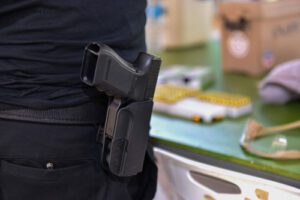 The District Court continued: The Court next addresses whether Plaintiffs are likely to experience irreparable injury if the Temporary Restraining Order is not issued. Finding the constitutional deprivations alleged to be irreparable by their very nature, the Court concludes that Plaintiffs have met their burden. In addition to likelihood of success on the merits, the movant must establish that it is more likely than not that it will suffer irreparable harm absent the relief requested. Reilly, 858 F.3d at 179. A deprivation of a constitutional right can demonstrate irreparable injury justifying injunctive relief, and “most courts hold that no further showing of irreparable injury is necessary.” Wright & Miller, 11A Fed. Prac. & Proc. Civ. § 2948.1 (3d ed.) (collecting cases).
The District Court continued: The Court next addresses whether Plaintiffs are likely to experience irreparable injury if the Temporary Restraining Order is not issued. Finding the constitutional deprivations alleged to be irreparable by their very nature, the Court concludes that Plaintiffs have met their burden. In addition to likelihood of success on the merits, the movant must establish that it is more likely than not that it will suffer irreparable harm absent the relief requested. Reilly, 858 F.3d at 179. A deprivation of a constitutional right can demonstrate irreparable injury justifying injunctive relief, and “most courts hold that no further showing of irreparable injury is necessary.” Wright & Miller, 11A Fed. Prac. & Proc. Civ. § 2948.1 (3d ed.) (collecting cases).
In the First Amendment context, a deprivation “unquestionably constitutes irreparable injury,” even if the deprivation is for “minimal periods of time.” Roman Catholic Diocese of Brooklyn v. Cuomo, 141 S. Ct. 63, 67 (2020) (citing Elrod v. Burns, 427 U.S. 347, 373 (1976) (plurality opinion)). This Court finds that the same is true in the Second Amendment context. Because the Second Amendment protects the right to bear arms for self-defense in public, state restrictions that are so extensive and burdensome as to render that right illusory must constitute irreparable injury. See Rhode v. Becerra, 445 F. Supp. 3d 902, 953 (S.D. Cal. 2020) (finding that burdensome restriction on purchase of ammunition constituted irreparable injury), vacated and remanded on other grounds sub nom. Rhode v. Bonta, 2022 WL 17099119 (9th Cir. Nov. 17, 2022); Grace v. District of Columbia, 187 F. Supp. 3d 124, 150 (D.D.C. 2016) (concluding that District of Columbia’s “good reason” requirement to obtain license to carry concealed firearm constituted irreparable injury).
As the Bruen Court observed, “[t]he constitutional right to bear arms in public for self-defense is not ‘a second-class right, subject to an entirely different body of rules than the other Bill of Rights guarantees.’” Bruen, 142 S. Ct. at 2156 (quoting McDonald, 561 U.S. at 780). Additionally, the fundamental interests that the Second Amendment protects—like those of the First Amendment—are not easily remediable by monetary damages or other non-injunctive relief. Ezell v. City of Chicago, 651 F.3d 684, 699 (7th Cir. 2011) (holding that infringement of Second Amendment right cannot be compensated by monetary damages because it protects “intangible and unquantifiable interests” similar to those protected by the First Amendment).
“Irreparable injury” refers to injury that can not be redressed with any amount of money. There is also the concern for irreparable physical injury in the case of a permit-to-carry holder who is prohibited from using a firearm to protect from serious bodily injury in public.
